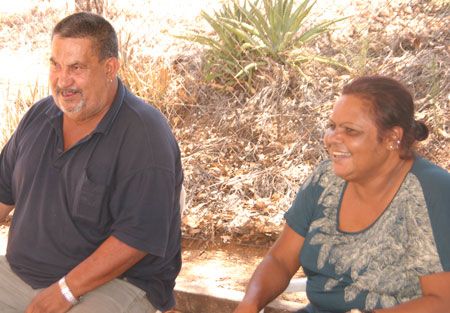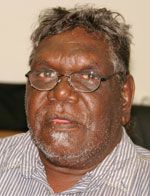Democracy is complicated in the shires
21 February 2012

By KIERAN FINNANE
The new rule prohibiting shire employees from standing for election to the shire council will have a big impact in MacDonnell Shire, with at least five of the 12 councillors opting to stay in their jobs and not run again in the March poll.
In the Rodinga Ward – covering the communities of Amoonguna, Santa Teresa, Titjikala and Finke – this is the case for all four councillors.
The rule seems like a ‘no brainer’ if you think about conflict of interest issues, but as ever, conditions in remote communities put a different slant on things.
Councillor Joe Rawson lives at Titjikala. He works as an essential services officer (ESO), and will not run again. The rule will “put a big hole in the Rodinga Ward”, he said. Does he think other candidates will come forward in the ward?
“It comes down to employment – 99% of employment comes through MacDonnell Shire. To try to get others to nominate who are not on the MacDonnell Shire payroll is very hard … if they don’t have motor vehicles, the shire won’t supply motor vehicles. You have to maintain your own vehicle to get to and from the meetings.
“We get an allowance – sitting fees, travel allowance every time we travel , but … if you do a diff on the way, you might get $700 to come to a meeting but it’ll end up costing $1400 to fix the diff.”
Councillor Lance Abbott (Luritja Pintubi Ward) also raised the vehicle issue. He would like someone else to take over as councillor. It’s a long way to attend meetings from his home community of Kintore and very taxing on his car. Kintore is 530 kms west of Alice Springs and almost 400 kms are by dirt road. So perhaps it’s not surprising that when he asks people if they’re interested in stepping in, “they keep saying, ‘No, you’re right’.”
Peter Wilson (Iyarrka Ward) is not yet employed by the shire but is likely to be when he returns home to Areyonga from Mutitjulu. So he won’t be standing again.
 “[At Areyonga] if a job comes up, nine times out of 10, it’s for the shire … whoever it was who decided that [employees can’t run] made a mistake in my opinion because a lot of the people who are on council are community leaders and mostly work and again, the shire being a dominant force in the community, they work for the shire. Maybe they didn’t think it through.”
“[At Areyonga] if a job comes up, nine times out of 10, it’s for the shire … whoever it was who decided that [employees can’t run] made a mistake in my opinion because a lot of the people who are on council are community leaders and mostly work and again, the shire being a dominant force in the community, they work for the shire. Maybe they didn’t think it through.”
Councillors Rawson and Wilson are among the more effective operators in council meetings that I’ve observed. Others who speak up and ask questions include President Sid Anderson (Luritja Pintubi) who will stand again and Cr Lisa Sharman (Rodinga) who won’t, as she works for the shire’s youth services. Cr Sharman loves to stir the pot and pursued with vigor a discussion over whether it would be possible to return the excised Ayers Rock Resort to the shire, making them subject to conditional rating. The council will be writing to the Territory Government, seeking further information about that possibility.
For the great part, however, meetings are focussed on reports form officers and their recommendations and most are adopted by councillors without much debate (this is even more the case at Central Desert Shire meetings). Cr Rawson pushed through a notable exception at last Thursday’s meeting. He had previously gained support for a shire trailer being put at the disposal of community members with their own vehicles, for collecting firewood. Anyone using the trailer would have to sign an agreement to pay for damage if it occurred.
On Thursday it was recommended to council, following contact by FaHCSIA (the Commonwealth Department of Indigenous Affairs), that they temporarily rescind the motion to allow for the FaHCSIA-funded CDEP to provide the service.
Cr Rawson wasn’t having a bar of that.
“CDEP doesn’t exist – they took it away from us years ago.”
He had no faith in the work-for-the-dole programs that have come in its place. One is run by Catholic Care and “all they want to do” is work in the gardens, said Cr Rawson. The other is run by CEA (Community Enterprise Australia) and “getting those blokes to work would be a miracle!”
He wanted the original motion to stand: “We live in the communities, we know what it’s like,” he insisted.
The shire trailer would only be used to collect firewood “for pensioners” – “not for the younger generation, they can get their own”. This arrangement would come at no cost to council.
He was supported by his colleagues and the original motion stands.
It may be a small issue but knocking back FaHCSIA and rejecting an officer recommendation was significant for the practice of representation.
After the meeting, I asked Cr Rawson whether he regrets the passing of the old community council system, whether it has meant a loss of local control. He was adamant: not at all.
SHIRES THE ‘BEST THING EVER’
“The shires are the best thing that ever happened to the community, they’ve taken away all the old entities that never worked – we always had vehicles and equipment out-dated, unregistered, unroadworthy. With the shire everything is roadworthy, registered and you must have a licence.
“That’s a good process to go forward with, so the younger generation know that when they get a job with the shire, they have to have a licence.”
To the same question Cr Wilson said “we could talk about that till the cows come home”.
“We’re here now. Get on with it. People have lost control of their own destiny to a degree but we’re here now and looking forward.”
Both men intend to remain active on their local boards, where the employment rule does not apply.
 Cr Abbott urged patience with the shire system: “We’re getting there. There’s plenty of work for the shire, 13 communities … Sometimes it’s hard to get around, you can’t fix it straight away, you’ve got to be patient.”
Cr Abbott urged patience with the shire system: “We’re getting there. There’s plenty of work for the shire, 13 communities … Sometimes it’s hard to get around, you can’t fix it straight away, you’ve got to be patient.”
The controversial issue of Section 19 lease payments for shire assets on Aboriginal land was considered in confidential session.
CEO Diane Hood, speaking to the Alice News afterwards, was less hot under the collar about it than her counterpart at Central Desert Shire. MacDonnell Shire councillors had endorsed the joint approach by the shires, reported on last week.
Beyond that she expressed no concern “at this stage” about timely progress of negotiations ahead of the August expiry of the Commonwealth’s five year township leases. As for possible financial impacts, they are “unknown until we go through the negotiations”, she said.
I asked individual councillors for their views on whether rent for shire facilities should be paid to Traditional Owners.
Cr Roxanne Kenny (Ljirapinta Ward), who is also Deputy Mayor and will stand again, said she thought that would be “all right”.
Even though it would be a cost to the shire?
“Yes.”
Cr Rawson agreed but he doesn’t want to see the money going into individuals’ pockets.
“Put it into some organisation that gives employment or education back to the kids, use it in schools, things like that. I don’t think there’s any benefit getting money if it doesn’t give your kids education out of it. All they see is their mother and father race off to town and do silly things with the money.
“If it can be adopted properly – ‘Righto, we’ll give $10,000 towards education of the kids’ – I’d like to see that happen. Don’t give the money away to people – stupidity!”
Where will the money come from?
“It’ll have to come out of local government money, won’t it?”
The joint shires are saying it will have an impact on services, unless it’s funded …
“Everything is funded from somewhere! All our funding comes from government.”
Councillors also considered behind closed doors a report back to them by the Northern Territory Government following their investigation of the shire over its proposed out-sourcing of an IT contract to India. Readers will recall from last year that councillors felt they had not been properly informed about the contract by officers including former CEO Graham Taylor, and they were very unhappy about the controversy it caused for the shire.
While they accepted that out-sourcing may provide benefit to the shire, they insisted that the contract remain on-shore.
Ms Hood told the Alice News that the investigation had found that there was “nothing illegal about out-sourcing” and that “the allegations in the media about the CEO’s remuneration were false”.
It also found that “internal communications could be better”; that the shire’s procurement policy “had not been followed to the letter of the law”; and that accounts processing and management could be improved.
Ms Hood said most of the government’s recommendations have already been adopted. She said since becoming CEO she has been trying to take a “simpler approach”: more “bite-sized” actions, focusing on “continual improvement rather than big bang solutions”.
UPDATE, February 23,2012: The Alice Springs News offered Community Enterprises Australia Ltd and Catholic Care right of reply in relation to Cr Joe Rawson’s comments on work-for-the-dole programs in Titjikala.
Carl Russelhuber, Employment Services Manager for Catholic Care NT replies: –
Contrary to Cr Rawson’s statement CatholicCare NT has in fact provided a number of programs which have had overall community acceptance and have produced positive results for the community.
Firstly, we are a Job Services Australia provider contracted by the Federal Government to deliver employment services, a part of which is Work Experience that is compulsory for a number of job seekers. Work for The Dole falls within work experience.
In 2009 shortly after the new JSA contract was rolled out I was invited to speak to the Titjikala Community at a community meeting and was asked what CatholicCare NT was going to do to get the people, particularly young people to work or do something. At this meeting I explained what we could and would do to assist the unemployed job seekers, and I also told the meeting that it would be compulsory for people in the Work Experience phase and for Early School Leavers to be engaged in an activity.
It was brought to my attention that the community had an existing market garden which had been run down and no-one was doing anything about it. I suggested that I could turn it into a work for the dole program where job seekers would learn real horticultural skills, and that there would be an opportunity to turn this into a social enterprise which would benefit the whole community and would create some employment. I added that social enterprise would only happen if there was a genuine commitment by the community to want to make it happen and people put their hands up.
There was an overwhelming response to accept my proposal for this activity to proceed.
I also stated that any fruit and vegetables produced should be distributed to the elderly people in the community at no cost.
This activity in Titjikala has provided 16 hours a week paid part time work for a male and female supervisor over a period of nearly 2 years.
In 2011 I engaged CDU to deliver Certificate I in Horticulture for work for the dole participant’s from the Market Garden Orchard activity.
In 2011 CDU was also engaged to deliver Certificate 1 in Business.
Commencing Monday February 27, 2012 in conjunction with Centre for Appropriate Technology and Charles Darwin University a Certificate II Automotive course is commencing which again has overall community support. There are 15 participants signed up to do this course and CDU who are providing a Language Literacy and Numeracy trainer have already conducted more than 6 LL&N assessments this week.
I am proud of what my staff have achieved in Titjikala.
CatholicCare NT has worked very hard to ensure that the job seekers and Titjikala community in general benefit from the activities and service we provide, and the general feedback from job seekers has been positive.
I have had previous contact with Cr Rawson and was not aware that he had concerns about our programs, although Cr Rawson is not contactable at the moment I will endeavour to meet with him to discuss his concerns.
Suzannah Kuzio, the CEO of Community Enterprises Australia Ltd says CEA is currently running “two successful projects at Titjikala”.
One is a CDEP Healthy Lifestyle program for women.
The other is a new men’s project “which involves a number of stakeholders on the community, assisting the men with setting up and re-engaging a men’s area”.
She says: “CEA will continue to meet its contractual obligations and provide CDEP programs and activities at Titjikala for the benefit of the community in accordance with FaHCSIA’s requirements for the duration of its contract.”
Pictured, from top: Councillors Joe Rawson and Roxanne Kenny – he will not stand again but she will. • Cr Peter Wilson won’t stand again. • Cr Lance Abbott will stand, but with some reluctance.


